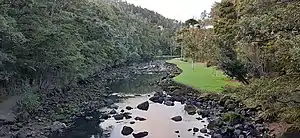Mairtown
Mairtown is a suburb of Whangārei, in Northland Region, New Zealand. It is about 2 kilometres north of the city centre.[3] Mair Park runs between Mairtown and the Hātea River.[4]
Mairtown | |
|---|---|
 Mair Park | |
| Coordinates: 35.708°S 174.325°E | |
| Country | New Zealand |
| City | Whangārei |
| Local authority | Whangarei District Council |
| Electoral ward | Whangārei Urban Ward |
| Area | |
| • Land | 94 ha (232 acres) |
| Population (June 2022)[2] | |
| • Total | 2,570 |
| Whau Valley | Otangarei | Tikipunga |
| Kensington |
|
(Hātea River) |
| Woodhill | Regent | Riverside |
The area is named for the early settler Mair Family, including Gilbert Mair and his son Robert.[5] Robert donated the land which is now Mair Park to the city in 1914.[6] Tawatawhiti / Mair's Landing on the Hātea River is on the New Zealand Heritage List.[7]
Demographics
Mairtown covers 0.94 km2 (0.36 sq mi)[1] and had an estimated population of 2,570 as of June 2022,[2] with a population density of 2,734 people per km2.
| Year | Pop. | ±% p.a. |
|---|---|---|
| 2006 | 2,205 | — |
| 2013 | 2,265 | +0.38% |
| 2018 | 2,475 | +1.79% |
| Source: [8] | ||
Mairtown had a population of 2,475 at the 2018 New Zealand census, an increase of 210 people (9.3%) since the 2013 census, and an increase of 270 people (12.2%) since the 2006 census. There were 1,083 households, comprising 1,101 males and 1,377 females, giving a sex ratio of 0.8 males per female. The median age was 47.6 years (compared with 37.4 years nationally), with 399 people (16.1%) aged under 15 years, 402 (16.2%) aged 15 to 29, 948 (38.3%) aged 30 to 64, and 723 (29.2%) aged 65 or older.
Ethnicities were 77.3% European/Pākehā, 27.2% Māori, 3.6% Pacific peoples, 6.7% Asian, and 1.7% other ethnicities. People may identify with more than one ethnicity.
The percentage of people born overseas was 19.4, compared with 27.1% nationally.
Although some people chose not to answer the census's question about religious affiliation, 43.9% had no religion, 40.2% were Christian, 1.9% had Māori religious beliefs, 0.7% were Hindu, 0.2% were Muslim, 0.7% were Buddhist and 2.7% had other religions.
Of those at least 15 years old, 360 (17.3%) people had a bachelor's or higher degree, and 507 (24.4%) people had no formal qualifications. The median income was $25,200, compared with $31,800 nationally. 222 people (10.7%) earned over $70,000 compared to 17.2% nationally. The employment status of those at least 15 was that 819 (39.5%) people were employed full-time, 255 (12.3%) were part-time, and 81 (3.9%) were unemployed.[8]
Notes
- "ArcGIS Web Application". statsnz.maps.arcgis.com. Retrieved 21 April 2022.
- "Population estimate tables - NZ.Stat". Statistics New Zealand. Retrieved 25 October 2022.
- Roger Smith, GeographX (2005). The Geographic Atlas of New Zealand. Robbie Burton. map 24. ISBN 1-877333-20-4.
- "Hatea River". Whangarei District Council. Retrieved 12 May 2020.
- "The River" (PDF). Whangarei District Council. Retrieved 12 May 2020.
- "Mair Park". Whangarei District Council. Retrieved 12 May 2020.
- Lambly, Annette (30 April 2018). "Mair's Landing officially recognised as a place of heritage significance". Stuff.
- "Statistical area 1 dataset for 2018 Census". Statistics New Zealand. March 2020. Mairtown (106800). 2018 Census place summary: Mairtown